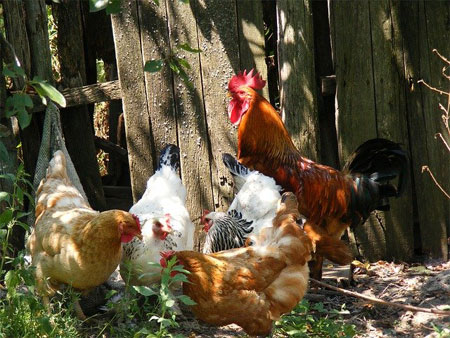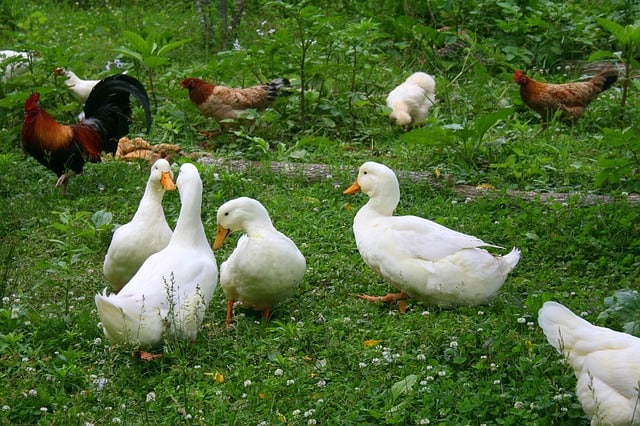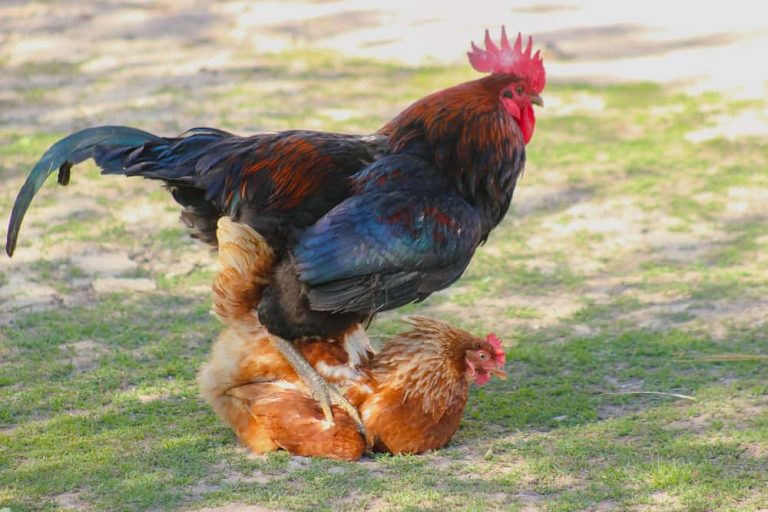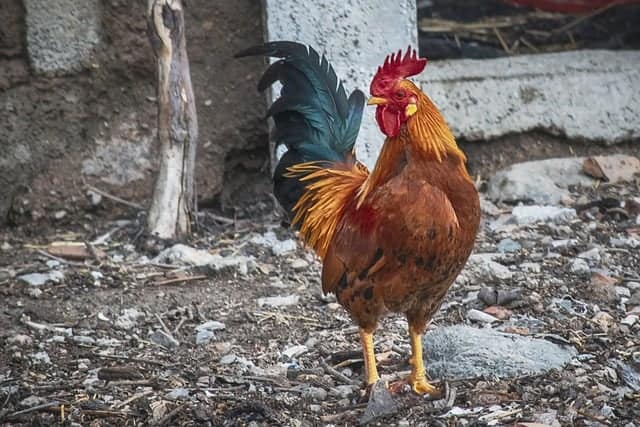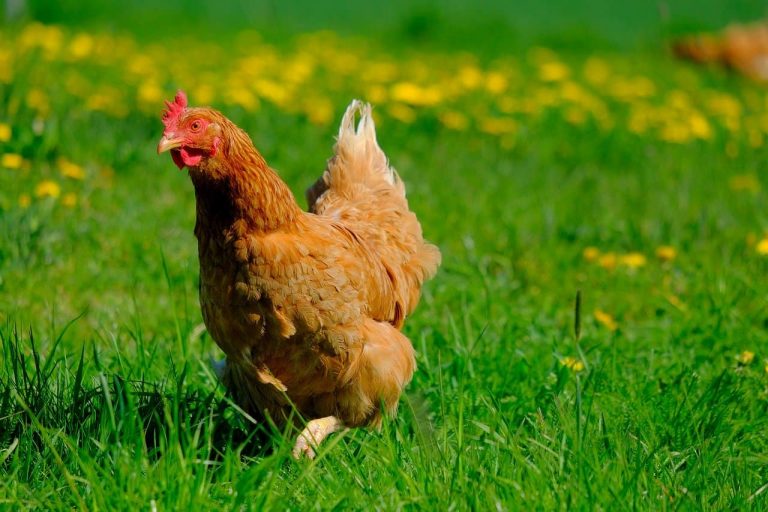Do hens need a rooster to lay eggs? Many backyard enthusiasts have asked this question times over. The answer is no; hens don’t need a rooster to lay eggs. Yet, they may do in certain circumstances.
In this article, I aim to settle this question once and for all. I will explain the science behind the ability of hens to lay unfertilized eggs. You will also find out why you might want to have a rooster anyway.
Contents
How an Egg Forms In a Hen
A healthy hen needs 24 to 27 hours to form an egg. The process starts with the formation of a yolk, which is released from the ovary. The yolk is named oocyte. Once formed, the oocyte is released into the oviduct of the hen.
The oviduct is pretty long (about two feet). This gives the oocyte enough time to rotate as it travels, forming the egg white around the yolk. As the young egg approaches the lower end of the oviduct, the shell begins to form.
The coloring of the shell is the last process in the oviduct. Hardening also takes place in the last part of the oviduct. If all proceed well, the hen will lay the egg once it has successfully passed through the oviduct.
The process happens regardless of whether a rooster fertilized the egg or not. If the egg is fertilized, the sperm and the ovum (the oocyte) unite, and an embryo develops. The growing embryo gets its nutrition from the yolk.
Where Does A Rooster Come In?
Depending on the breed, roosters become sexually active after a few months. Once mature, the roosters develop the strength and courtship skills to mate with hens. The courtship rituals are elaborate and include rooster dancing and tidbitting.
A few lazy but ferocious roosters may take a more direct approach. Regardless of the foreplay, the ultimate goal is for the rooster to hope on the back of the hen. It will then perform the cloacal kiss to deliver sperm into the oviduct.
An appropriate technique is necessary for successful fertilization. The sperm will fertilize the egg of the day in the oviduct. However, a single ejaculation can fertilize eggs for a week or slightly longer.
When to Have a Rooster in the Coop
We have already seen that hens will lay eggs whether a rooster is in the coop or not. The question is, in what situations will you need the rooster?
- If you intend to expand your flock
- If you need natural protection for your flock against predators
- To bring order and harmony among members of the flock
- Beauty and completeness of the flock
- Roosters may have a good personality
Let’s expound further on these benefits.
- Expanding your flock: Only fertilized eggs can develop and hatch into chicks. Select big, healthy, and good-quality roosters to give forth to healthy chicks.
- Natural protection: Take a good look at a fully grown rooster. It has a strong beak, long, sharp spurs, and claws. The features make these birds strong, fearsome, and intimidating to predators. Roosters also sound alarms to warn other flocks of impending danger.
- Ensure harmony and order: Male and female chickens live naturally intermixed. In their natural environment, the boys know how to keep hierarchical order in the coop. They break fights between hens, search for treats and offer them to hens. They also monitor nest boxes and encourage egg-laying.
- Beauty and completeness: No one can deny the beauty of a flock complete with roosters and hens. Roosters are gorgeous and classic icons. They are simply awesome.
- Good Personality: It may be a disadvantage if you look at it in other ways, but roosters have a personality. These drama kings can entertain via funny dances and performances. However, roosters can also be temperamental.
What are the Flaws of a Rooster?
It makes sense to have a rooster in your flock for continuity and other benefits. However, this male fowl can put you and your flocks into many problems. Before discussing each disadvantage in detail, here is a sneak preview:
- A healthy rooster can’t keep quiet
- You might be fined or jailed if you own a rooster
- Roosters may not give hens a break
- Young children and pets may be at the mercy of roosters
Let’s now expound on these disadvantages:
1. Roosters are pretty noisy
I once heard a teacher mention the advantages and disadvantages of chicken farming. One drawback caught my attention. He said chickens are noisy, especially the roosters.
Roosters have to crow early each morning. They also crow at predictable intervals throughout the day. The noise can be loud if you have a couple of these birds. Certain jurisdictions have banned roosters, especially in urban neighborhoods, citing noise pollution.
Even if you do not have a problem with the noise and the laws do not forbid it, you still have neighbors to deal with. Your neighbors may not wish to be woken up too early or have their peace disturbed.
Also Read: 10 Questions to Ask Yourself Before You Get Backyard Chickens
2. Inappropriate rooster/hen ration can wear hens out
The sexual act between chickens isn’t consensual. If you doubt it, take your time and watch the birds as they mate. Hens run away because the experience is not pleasant at all.
Having too many roosters for only a few hens can be catastrophic. Ferocious and aggressive male chickens can wear hens out pretty quickly. A single rooster can successfully manage 10 to 12 hens.
A higher ratio than this and consequent over-mating will exhaust and wear out your hens. Signs of wear out are obvious physical exhaustion; backs rubbed clean of feathers. Speak to a backyard expert if you must keep roosters too.
3. Roosters can be aggressive and dangerous if not trained
Have you ever encountered an angry, irritated, and aggressive rooster? I bet you will stay as far away from it as possible. Such birds do not shy from attacking with wings, strong shanks, and sharp spurs. They also use their strong beaks and needle-sharp claws.
Consider those issues before choosing to rear roosters along with hens. This is particularly vital if you have small children and other pets. The long, sharp spurs can easily break the skin and cause serious injuries. However, you can train the birds to respect you and others.
What Differentiates Fertilized from Unfertilized Eggs?
Yes, there is a big difference. Fertilized eggs have a developing embryo by the time the hens lay them. However, if you collect eggs for consumption each day or two, there will be no difference in taste or quality.
You are unlikely to find a developing embryo therein because it is still too tiny. Differences are in color, consistency, flavor, and nutrient content. They will come after a few days of incubation.
Incubation maintains a level of temperature embryos need to develop into viable chicks. So, if you retain temperatures below the optimum, then the embryo won’t grow. This will preserve the egg a little longer.
Bottom line
Let me throw the question back to you, do hens need a rooster to lay eggs? I believe you now have the answer. If you keep hens for egg collection, you won’t need to keep a rooster.
You can bring in one only if you need to expand your flock. Do so only if the laws allow it. Without a rooster, healthy hens are likely to lay more eggs during their lifetime. It’s upon you now to consider the merits and demerits and make the right choice.

